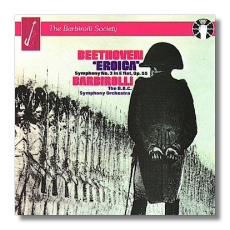
The Internet's Premier Classical Music Source
Related Links
- Beethoven Reviews
- Latest Reviews
- More Reviews
-
By Composer
-
Collections
DVD & Blu-ray
Books
Concert Reviews
Articles/Interviews
Software
Audio
Search Amazon
Recommended Links
Site News
 CD Review
CD Review
Ludwig van Beethoven

Symphony #3 "Eroica"
- Ludwig van Beethoven: Symphony #3 "Eroica"
- John Barbirolli: Elizabethan Suite
BBC Symphony Orchestra/John Barbirolli
Dutton Laboratories/Barbirolli Society CDSJB1008
H. L. Mencken wrote, in 1922, "The older I grow, the more I am convinced that the most portentous phenomenon in the whole history of music was the first public performance of the Eroica on April 7, 1805." Mencken then goes on to give a really interesting analysis of the whole piece. In fact, I am tempted to quote all of what Mencken had to say about the Eroica but will add only one other passage: "…the feelings that Beethoven put into his music were the feelings of a god…He is a great tragic poet, and like all great tragic poets, he is obsessed by a sense of the inscrutable meaninglessness of life. From the Eroica onward he seldom departs from that theme." Any great performance of this symphony needs to capture the essence of that revolutionary moment and the depths and peaks of its inherent nature. I hope to share but a few thoughts about other recordings of the Eroica.
My collection includes 10 recordings of this piece. I have a special affection for the Giulini with the Los Angeles Philharmonic Orchestra because I watched it performed when he toured with that orchestra and stopped in Columbus, Ohio. I remember listening to it and during the second movement I realized someone was wrong. Then I realized someone was humming. Then I realized that somehow the orchestra had gotten temporarily lost and the conductor was brining them back together by 'singing'. I also have a fondness for the Bernstein VPO recording. I recall being fascinated watching the performance on PBS. I found the recording, however, less riveting. I have a love of Bruno Walter's Autumn Summer recording. The two Furtwängler performances I own (1944 and 1952) are special. They are such a wrenching emotional experience that I have to be ready for them. Monteux's recording with the Concertgebouw is absolutely a must have for anyone who thinks they know this piece. Whenever I want to listen to the Eroica in the future, however, I will first reach for the Barbirolli.
Now for details. A large influence on my thinking in the area of the philosophy of music comes from Robert Jourdain's book, Music, the Brain, and Ecstasy, and another on the science of the brain. Music affects the areas of the brain closely connected to those related to physical response. In some cases the same work, differently interpreted and/or recorded will or will not produce as strong a stimulus. This Barbirolli recording stimulates synapses in my brain that make me want to move, that produce a pleasant sensation within my brain. Barbirolli adopts an expansive tempi, but there is an underlying tension throughout. The first movement opens with an organic, pulsing sensation. This is a living thing, not just black dots on white paper. The second movement is my favorite. I will sometimes keep a recording that I do not like overall, just for the second movement. In this case, it is stunning and part of the fabric. The woodwinds have a pungent, reedy sound to them, like some autumnal air. The brass have a burnished sound that adds to this effect. This is what I want played at my funeral, then send everyone to a picnic to roast their wieners over my pyre. The third movement has a Haydenesque quality to it that produces a smile on my face. The final movement, as a jazz friend of mine puts it, "kicks my shit." For the first time in my listening to the Eroica I realized that the final notes of the symphony are an echo of the opening ones. Overall, Barbirolli produces an interpretation that has passion and poise. In a 1972 Washington Post interview with Michael Kernan, Stokowski said, "I do everything with my ears." This is as it should be and is when evaluating a performance. The score is not really necessary when making judgments of such a nature.
I should mention that Barbirolli's arrangement of an English Suite is icing on the cake. I am glad to have it.
For what it's worth, I was glad to see that Dutton reproduced the same picture on the cover of their CD that adorned the original LP. On the other hand, the insert notes are an insult to Barbirolli. Almost all of it is a discussion about the symphony (to which you would be better off to turn to Steinberg's book). What reference there is to Sir John hedges its endorsement of the great conductor.
I do not normally review discs I have to pay for, especially when I have to go through a lot of trouble to get a copy. I won't go into a lot of detail about the problems I had getting this disc, but apparently I have to offer an apology to Mr. Dutton for previous negative reviews of his work. So it goes. The main point is that this recording is the finest interpretation of Beethoven's Eroica that I have.
Over the years I have worked as President of the Leopold Stokowski Society of America I have had the pleasure of talking with some of the producers at the major recording companies. I have been pestering Rob LaPorta, at EMI, for a release of this recording. Now I see it incarnated in this Barbirolli Society disc. Thank you, thank you, thank you.
Copyright © 1998, Robert Stumpf II


















